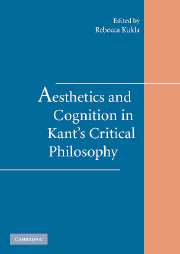Book contents
- Frontmatter
- Contents
- Notes on Contributors
- Acknowledgments
- 1 Introduction: Placing the Aesthetic in Kant's Critical Epistemology
- PART I SENSIBLE PARTICULARS AND DISCURSIVE JUDGMENT
- 2 Thinking the Particular as Contained under the Universal
- 3 The Necessity of Receptivity: Exploring a Unified Account of Kantian Sensibility and Understanding
- 4 Acquaintance and Cognition
- PART II THE COGNITIVE STRUCTURE OF AESTHETIC JUDGMENT
- PART III CREATIVITY, COMMUNITY, AND REFLECTIVE JUDGMENT
- Bibliography
- Index
4 - Acquaintance and Cognition
Published online by Cambridge University Press: 24 July 2009
- Frontmatter
- Contents
- Notes on Contributors
- Acknowledgments
- 1 Introduction: Placing the Aesthetic in Kant's Critical Epistemology
- PART I SENSIBLE PARTICULARS AND DISCURSIVE JUDGMENT
- 2 Thinking the Particular as Contained under the Universal
- 3 The Necessity of Receptivity: Exploring a Unified Account of Kantian Sensibility and Understanding
- 4 Acquaintance and Cognition
- PART II THE COGNITIVE STRUCTURE OF AESTHETIC JUDGMENT
- PART III CREATIVITY, COMMUNITY, AND REFLECTIVE JUDGMENT
- Bibliography
- Index
Summary
What does my dog see when he sees a bus? This might seem to be an odd question with which to begin an essay on Kant. In fact, it is a question that goes to the heart of a puzzle that I have always found to be quite deep. The puzzle can be made intuitively clear to almost anyone, regardless of philosophical training. But it is also a puzzle that touches the core of the Kantian enterprise, and that can be put quite clearly as a question concerning the details of Kant's views regarding the relationship between the possibility of self-consciousness and the possibility of representing objects as objects. The puzzle is this: Is there any sense in which animals who lack reflection in the human sense, and thus also lack a discursive understanding and the capacity to form judgments, nevertheless represent entities as objects distinct from their own representations? If the answer to this question is “yes,” as I will argue that it must be, then we must confront a new and different question: What, exactly, are reflection and the capacity to judge necessary for?
THE STRUCTURE OF THE PROBLEM
The Intuitive Formulation
In its intuitive, secular form, here is the problem. There is surely a sense in which my dog (whose name is Mac) sees the large yellow school bus that, every weekday afternoon at 3:20, turns the corner on which our house sits.
- Type
- Chapter
- Information
- Aesthetics and Cognition in Kant's Critical Philosophy , pp. 85 - 108Publisher: Cambridge University PressPrint publication year: 2006
- 2
- Cited by

